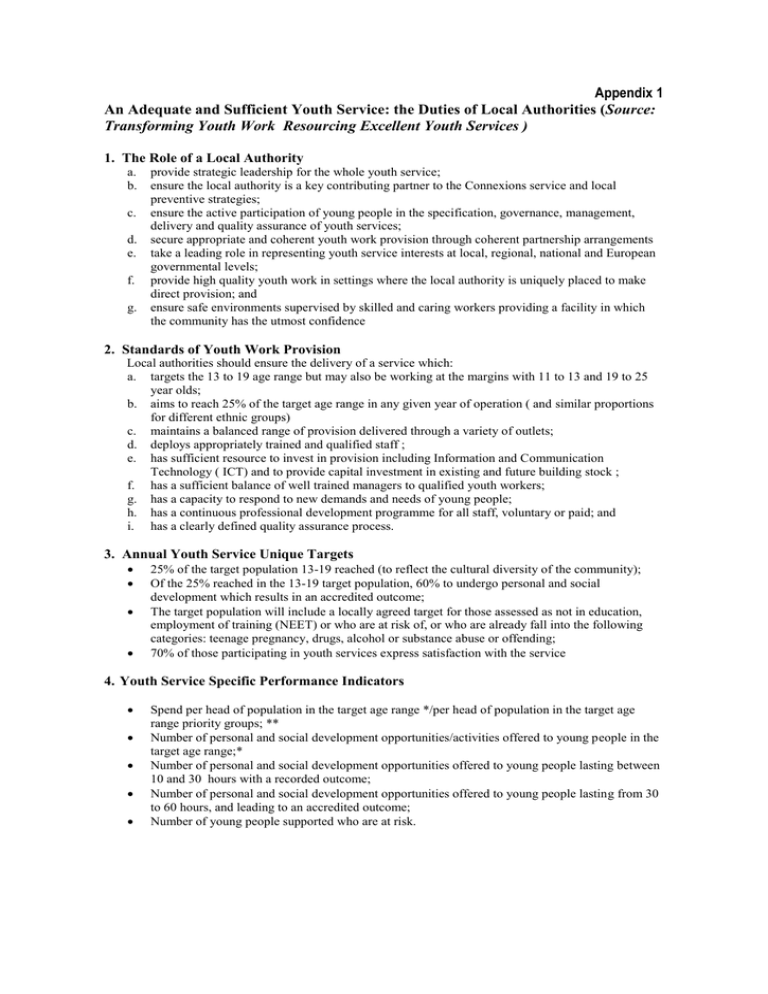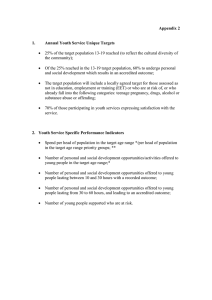Appendix 1 Source: Transforming Youth Work
advertisement

Appendix 1 An Adequate and Sufficient Youth Service: the Duties of Local Authorities (Source: Transforming Youth Work Resourcing Excellent Youth Services ) 1. The Role of a Local Authority a. b. c. d. e. f. g. provide strategic leadership for the whole youth service; ensure the local authority is a key contributing partner to the Connexions service and local preventive strategies; ensure the active participation of young people in the specification, governance, management, delivery and quality assurance of youth services; secure appropriate and coherent youth work provision through coherent partnership arrangements take a leading role in representing youth service interests at local, regional, national and European governmental levels; provide high quality youth work in settings where the local authority is uniquely placed to make direct provision; and ensure safe environments supervised by skilled and caring workers providing a facility in which the community has the utmost confidence 2. Standards of Youth Work Provision Local authorities should ensure the delivery of a service which: a. targets the 13 to 19 age range but may also be working at the margins with 11 to 13 and 19 to 25 year olds; b. aims to reach 25% of the target age range in any given year of operation ( and similar proportions for different ethnic groups) c. maintains a balanced range of provision delivered through a variety of outlets; d. deploys appropriately trained and qualified staff ; e. has sufficient resource to invest in provision including Information and Communication Technology ( ICT) and to provide capital investment in existing and future building stock ; f. has a sufficient balance of well trained managers to qualified youth workers; g. has a capacity to respond to new demands and needs of young people; h. has a continuous professional development programme for all staff, voluntary or paid; and i. has a clearly defined quality assurance process. 3. Annual Youth Service Unique Targets 25% of the target population 13-19 reached (to reflect the cultural diversity of the community); Of the 25% reached in the 13-19 target population, 60% to undergo personal and social development which results in an accredited outcome; The target population will include a locally agreed target for those assessed as not in education, employment of training (NEET) or who are at risk of, or who are already fall into the following categories: teenage pregnancy, drugs, alcohol or substance abuse or offending; 70% of those participating in youth services express satisfaction with the service 4. Youth Service Specific Performance Indicators Spend per head of population in the target age range */per head of population in the target age range priority groups; ** Number of personal and social development opportunities/activities offered to young people in the target age range;* Number of personal and social development opportunities offered to young people lasting between 10 and 30 hours with a recorded outcome; Number of personal and social development opportunities offered to young people lasting from 30 to 60 hours, and leading to an accredited outcome; Number of young people supported who are at risk. 5. Benchmark for developing a Local Pledge to Young People 6. A safe, warm, well equipped meeting place within reasonable distance of home, accessible to young people at times defined by young people, giving an opportunity to participate in personal and social development activities including arts, drama, music, sport, international experience and voluntary action A wide diversity of youth clubs, projects and youth activities A set of programmes, related to core youth work values and principles, based on a curriculum framework which supports young people’s development in citizenship, the arts, drama, music, sport, international experience and personal and social development, including residential experiences and peer education; A comprehensive generic, confidential information, advice and counselling service; Mechanisms for ensuring that their voice is heard, perhaps ( though not exclusively) through a youth council or youth forum for each locality, with the intention of supporting youth engagement in local democracy in a wide range of ways; An annual youth service questionnaire involving young people in auditing and evaluating the services (provided by the local authority youth service) available to them locally A defined project to promote and secure youth volunteering and voluntary action; and The opportunity to participate in programmes which offer accreditation for learning such as the Duke of Edinburgh’s Award , Youth Achievement Award or similar. Youth Work Values Young people choose to be involved, not least because they want to relax, meet friends and have fun; The work starts where young people are – with their view of the world and their interests; It seeks to go beyond where young people start, in particular by encouraging them to be critical and creative in their responses to their experience and the world around them and supporting their exploration of new ideas, interests and creative ability; It takes place because young people are young people, not because they have been labelled or categorised as deviant; It recognises, respects and is actively responsive to the wider network of peers, communities and cultures which are important to young people; Through these networks it seeks to help young people achieve stronger relationships and collective identities- for example, as black people, women, men, disabled people, gay men or lesbians – and through the promotion of inclusivity, particularly for minority ethnic communities; It is concerned with how young people feel and not just with what they know and can do; It is concerned with facilitating and empowering the voice of young people; It is concerned with ensuring young people can influence the environment within which they live It respects and values individual differences by supporting and strengthening young people’s belief in themselves and their capacity to grow and change; It works with other agencies which contribute to young people’s social and personal development; and It complements and support school and college- based education by encouraging and providing other opportunities for young people to achieve and fulfil their potential.
